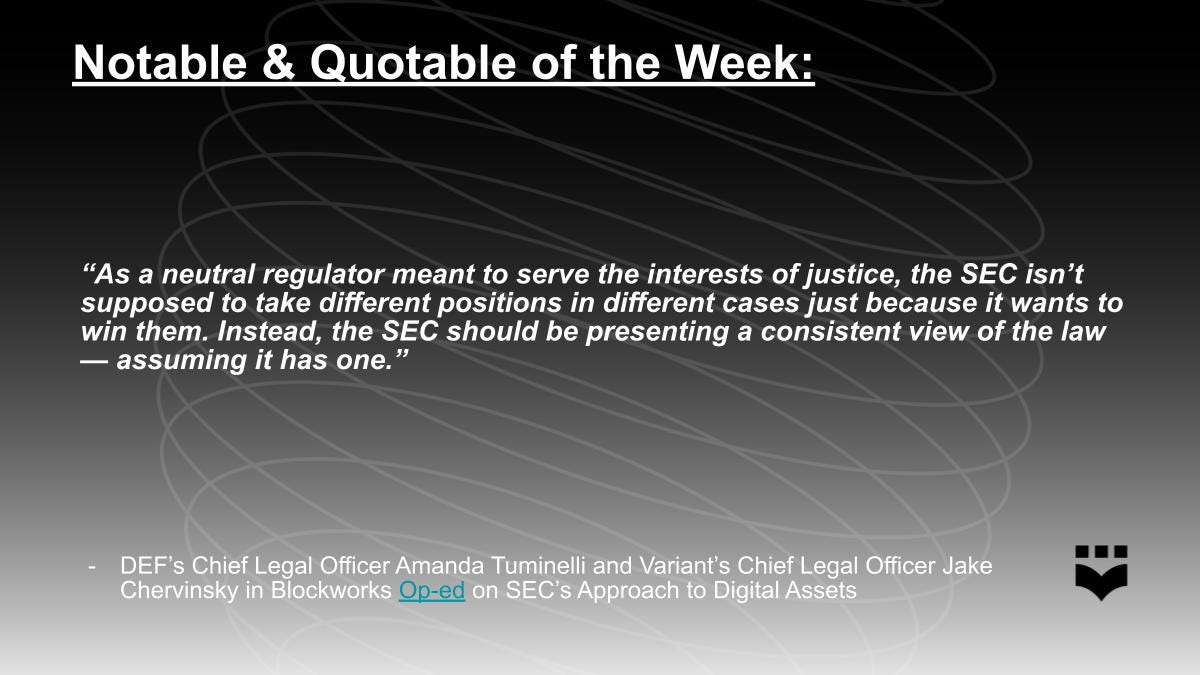Crypto.com Wells Notice and Preemptive Lawsuit; Broker Rulemaking Update
Crypto.com Wells Notice and Preemptive Lawsuit
What happened?
Last Tuesday, Crypto.com filed a lawsuit against the Securities and Exchange Commission (SEC) in the District Court for the Eastern District of Texas. Crypto.com’s suit seeks declaratory and injunctive relief following its receipt of a Wells Notice, a formal letter from SEC staff indicating their intent to recommend that the Commission bring an enforcement action against the company for alleged securities law violations.
In its suit, Crypto.com asserts that the SEC has exceeded its statutory authority and engaged in de facto rulemaking in violation of the Administrative Procedure Act (APA) by classifying nearly all secondary market sales of network tokens as securities transactions, regardless of how they are sold, while arbitrarily excluding similar transactions involving bitcoin and ether.
The complaint outlines several reasons why secondary market sales of the “Targeted Network Tokens” don’t satisfy the standard under Howey, which requires an investment of money in a common enterprise with a reasonable expectation of profits to be derived from the efforts of others:
The term “Crypto Asset Security” is not included in any statutory definition of security, nor do the Targeted Network Tokens possess characteristics usually associated with securities, such as profit sharing or dividends;
Sales of the Targeted Network Tokens on Crypto.com are not sold as part of any scheme or transaction with the original issuer;
There is no relationship between Crypto.com and the issuer of the Targeted Network Tokens;
Crypto.com makes no representations nor takes on any ongoing obligations to deliver future value to the purchasers of the Targeted Network Tokens on Crypto.com;
Purchasers of the Targeted Network Tokens on Crypto.com make no investment of money in a common enterprise with the issuer; and
The Targeted Network Tokens are functionally similar to Bitcoin and Ether and the SEC’s treatment of them as different is arbitrary and capricious.
Crypto.com is asking the court to rule that the Network Tokens sold on its platform are not securities and that it is not operating as an unregistered broker-dealer or clearing agency. The complaint also requests that the court invalidate the SEC’s de facto rule and prevent the SEC from enforcing the rule against it.
In addition to filing suit this week, Crypto.com has filed a petition for rulemaking to compel the issuance of a joint interpretation by the SEC and the Commodity Futures Trading Commission (CFTC) to create clear, consistent regulations for digital assets moving forward.
What does this mean?
Although the SEC has recently (and inconsistently) acknowledged that tokens are not securities, it has continued to assert jurisdiction over secondary-market sales of digital assets. Crypto.com’s suit is another instance of the industry taking offensive measures to combat the SEC’s drastic and unlawful assertion of authority over nearly all digital asset transactions. Suits like this not only protect businesses from an overreaching government but also give the courts an opportunity to provide much-needed clarity for the entire industry.
We commend Crypto.com for their efforts in fighting SEC overreach and look forward to a day when industry and regulators can work together to build a framework that promotes innovation and is beneficial for all.
Broker Rulemaking Update
What happened?
The Internal Revenue Service (IRS) has reopened for comments the Paperwork Reduction Act’s application to the broker rulemaking. Importantly, the IRS had chosen to exclude DeFi from the rulemaking and changed Form 1099-DA since its previous comment period. Form 1099-DA is the first tax form proposed for reporting digital asset transactions. The previous 1099-DA draft form included a section for “Broker type involved in transaction” which included “Un-hosted Wallet Provider”—implying that developers of un-hosted wallets were brokers.
What does this mean?
The reopening is a standard APA procedure given that the IRS had chosen to exclude DeFi from the rulemaking and changed Form 1099-DA to accommodate these changes.



